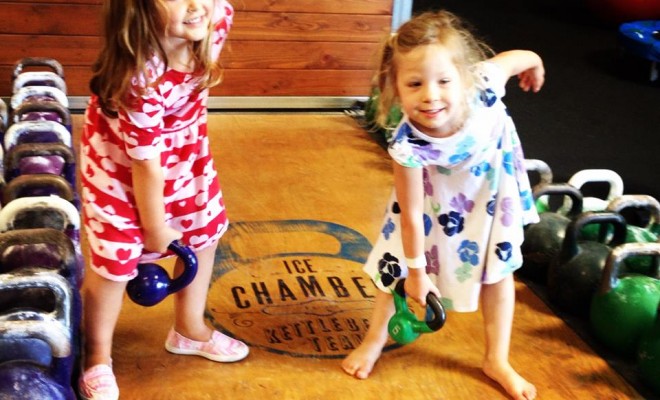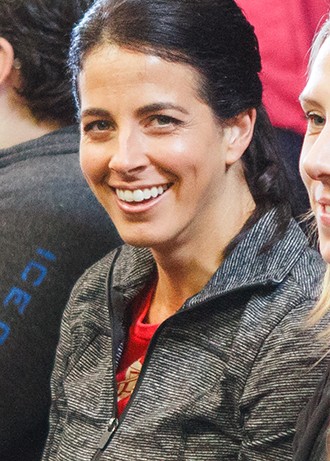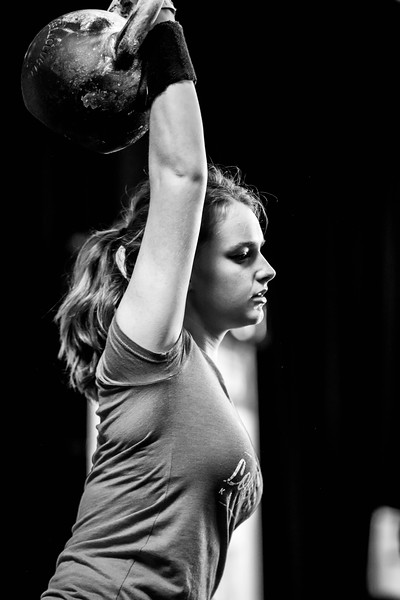
Kettlebell Sport for Kids
Designing kettlebell workouts for children is a challenging endeavor. To succeed children have to enjoy the process of learning new technical skills. The relationship between KB student and teacher is key, especially if the young lifter is interested in competing in Kettlebell Sport.
Sara Nelson, Master of Sport & Coach to the next generation of Ice Chamber Kettlebell lifters, shares her experience retaining and developing young lifters with a range of goals from family fitness to Kettlebell Sport glory.
 At approximately what age should children begin lifting kettlebells?
At approximately what age should children begin lifting kettlebells?
Sara: It depends on the individual. Some kids really adapt fast to change, have greater ranges of motion, just pick up technique really fast. Gauge each child based on his/her uniqueness. Generally speaking, it is safe as long as you don’t overload the children before he/she is ready for the weight. Just work with them on movement patterns and let them have fun.
What is the youngest child you have trained?
Sara: I believe that would be Rylee. She was 7 getting ready to turn 8 when she began taking classes.
What do you have children do at that age?
Sara: Have fun! Try to engage them and relate it to some fun activity they may already like to do. For example making the swing more like a challenge; a race, an obstacle, some dynamic play. They have to have fun, otherwise they won’t stick with it.
When do you think it is appropriate to introduce them to competition or a competitive environment?
Sara: I think competition is good at any age so that children learn the value of both winning and losing with ease. I’m a bit conservative when it comes to Kettlebell Sport though, and want to wait until our students are in their teens before they compete because we have to deal with the issues of weight divisions, weighing-in, and body issues from the additional pressure of being on stage and on YouTube. With that being said, it definitely depends on each unique child– some adapt well to the pressure of competition and really thrive in that environment. There is no formula.
Do you encourage children to do kettlebells alone or include other recreational activities as well?
 Sara: I think it’s great when the child does a couple of other things besides kettlebells. They need to have choices and when it’s their own decision to lift kettlebells, you get the best students. But if the child wants to be a Kettlebell Sport athlete he/she should focus on lifting, but also include other supplemental training to support their growing body and also so they don’t get bored.
Sara: I think it’s great when the child does a couple of other things besides kettlebells. They need to have choices and when it’s their own decision to lift kettlebells, you get the best students. But if the child wants to be a Kettlebell Sport athlete he/she should focus on lifting, but also include other supplemental training to support their growing body and also so they don’t get bored.
What are some of your concerns when working with young kettlebell athletes?
Sara: It’s important to not push them too hard because we might not understand their true scope of abilities. But it’s also important to consistently encourage them to move forward to work at higher standards. When it comes to tween girls and boys, we are careful not to focus on bodyweight and image. We need to protect them from an environment where they have to worry about “making weight” for a different division, which in this sport means losing weight.
At what point do you allow the child to increase the load of the kettlebell?
Sara: They first have to show quality, good fixation, good technique. Then they have to demonstrate those qualities by doing a lot of reps. We don’t necessarily judge progress based on strength, but on the ability to lift the weight effortlessly with control and poise. Take into account their age too. If they are under 13 or 12, I’m cautious about overloading them.
How do you develop young champions?
Sara: Provide great role models for them to follow. Show them they are loved no matter how they perform. Include them in the decision making process. Allow them time for their own desires to come out!
Show us a sample program for a teenage lifter.
Sara: Monday – P.E. at school or free recreation / Tuesday – technique work with press, push press, jerk, clean / Wednesday – conditioning with a variety of lifts at a higher intensity / Thursday – technique work with snatch / Friday – Rest / Saturday – longer timed sets for testing and benchmarking / Sunday – recreation and rest




1 Comment